人教版高一英语必修二 Unit 2 The Olympic Games writing 课件
- 格式:ppt
- 大小:1.18 MB
- 文档页数:34
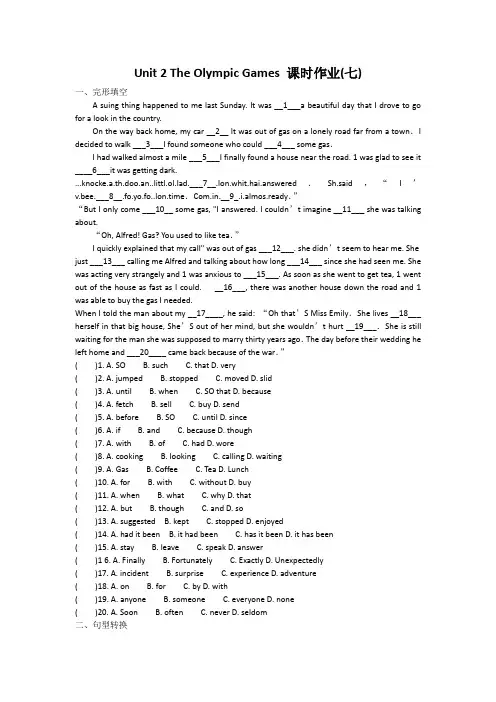
Unit 2 The Olympic Games 课时作业(七)一、完形填空A suing thing happened to me last Sunday. It was __1___a beautiful day that I drove to go for a look in the country.On the way back home, my car __2__ It was out of gas on a lonely road far from a town.I decided to walk ___3___I found someone who could ___4___ some gas.I had walked almost a mile ___5___I finally found a house near the road. 1 was glad to see it ____6___it was getting dark.d.___7__.lon.whit.hai.answered.Sh.said,“I’v.bee.___8__.fo.yo.fo..lon.time.Com.in.__9_.i.almos.ready.”“But I only come ___10__ some gas, "I answered. I couldn’t imagine __11___ she was talking about.“Oh, Alfred! Gas? You used to like tea.”I quickly explained that my call" was out of gas ___12___. she didn’t seem to hear me. She just ___13___ calling me Alfred and talking about how long ___14___ since she had seen me. She was acting very strangely and 1 was anxious to ___15___. As soon as she went to get tea, 1 went out of the house as fast as I could. __16___, there was another house down the road and 1 was able to buy the gas I needed.When I told the man about my __17____, he said: “Oh that’S Miss Emily.She lives __18___ herself in that big house, She’S out of her mind, but she wouldn’t hurt __19___.She is still waiting for the man she was supposed to marry thirty years ago.The day before their wedding he left home and ___20____ came back because of the war.”( )1. A. SO B. such C. that D. very( )2. A. jumped B. stopped C. moved D. slid( )3. A. until B. when C. SO that D. because( )4. A. fetch B. sell C. buy D. send( )5. A. before B. SO C. until D. since( )6. A. if B. and C. because D. though( )7. A. with B. of C. had D. wore( )8. A. cooking B. looking C. calling D. waiting( )9. A. Gas B. Coffee C. Tea D. Lunch( )10. A. for B. with C. without D. buy( )11. A. when B. what C. why D. that( )12. A. but B. though C. and D. so( )13. A. suggested B. kept C. stopped D. enjoyed( )14. A. had it been B. it had been C. has it been D. it has been( )15. A. stay B. leave C. speak D. answer( )1 6. A. Finally B. Fortunately C. Exactly D. Unexpectedly( )17. A. incident B. surprise C. experience D. adventure( )18. A. on B. for C. by D. with( )19. A. anyone B. someone C. everyone D. none( )20. A. Soon B. often C. never D. seldom二、句型转换1. Every four years athletes from all over the world take part in the Olympics.Every ____year, athletes from all over the world______ ______the Olympics.2. Beijing will hold the 29th Olympic Games in the year 2008.The 29th Olympic Games______ ______ _______in Beijing in the year 2008.3. We will plant more trees and build new roads in Beijing for this event.More trees_____ _____ _____and new roads_____ ______in Beijing for thisevent.4. It is not easy for me to decide which one I should buy.It is not easy for me to decide which one____ ____.5. 1 went home after I finished my homework.I______ ______ go home ______I finished my homework.三、阅读理解Countries CountEarth’S landmasses are divided into seven continents: Africa, Asia, Europe, North America, South America, Australia, and Antarctica.This graph(柱状图)shows the number of countries on each continent( )1. Which continent has almost twice as many countries as South America?A. Europe.B. North America.C. Australia.D. Asia.一、完形填空1. B2. B3. A4. B5. A6. C7. A8. D9. C 10. A 11.B 12. A 13. B 14. B 15. B 16. B 17.C 18. C 19. A 20. C二、句型转换1. fourth join in2. will be held3. will be planted be built4. to buy5. did not until三、阅读理解1. B。
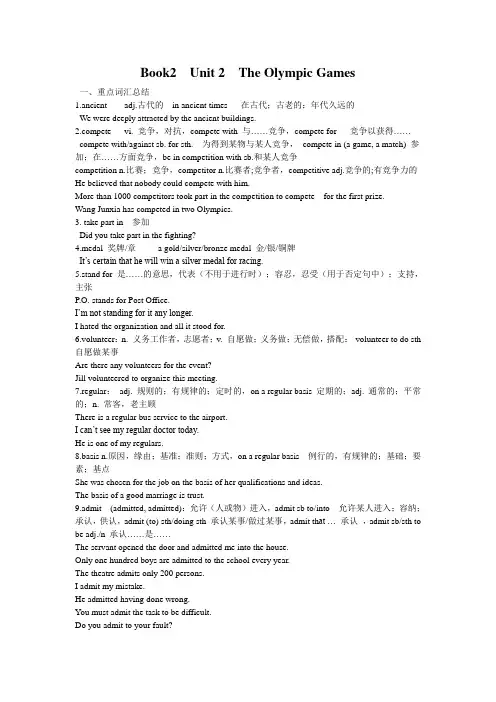
Book2 Unit 2 The Olympic Games一、重点词汇总结1.ancient adj.古代的in ancient times 在古代;古老的;年代久远的We were deeply attracted by the ancient buildings.pete vi. 竞争,对抗,compete with 与……竞争,compete for 竞争以获得……compete with/against sb. for sth. 为得到某物与某人竞争,compete in (a game, a match) 参加;在……方面竞争,be in competition with sb.和某人竞争competition n.比赛;竞争,competitor n.比赛者;竞争者,competitive adj.竞争的;有竞争力的He believed that nobody could compete with him.More than 1000 competitors took part in the competition to compete for the first prize.Wang Junxia has competed in two Olympics.3. take part in 参加Did you take part in the fighting?4.medal 奖牌/章 a gold/silver/bronze medal 金/银/铜牌It’s certain that he will win a silver medal for racing.5.stand for 是……的意思,代表(不用于进行时);容忍,忍受(用于否定句中);支持,主张P.O. stands for Post Office.I’m not standing for it any longer.I hated the organization and all it stood for.6.volunteer:n. 义务工作者,志愿者;v. 自愿做;义务做;无偿做,搭配:volunteer to do sth 自愿做某事Are there any volunteers for the event?Jill volunteered to organize this meeting.7.regular:adj. 规则的;有规律的;定时的,on a regular basis 定期的;adj. 通常的;平常的;n. 常客,老主顾There is a regular bus service to the airport.I can’t see my regular doctor today.He is one of my regulars.8.basis n.原因,缘由;基准;准则;方式,on a regular basis 例行的,有规律的;基础;要素;基点She was chosen for the job on the basis of her qualifications and ideas.The basis of a good marriage is trust.9.admit (admitted, admitted):允许(人或物)进入,admit sb to/into 允许某人进入;容纳;承认,供认,admit (to) sth/doing sth 承认某事/做过某事,admit th at … 承认,admit sb/sth to be adj./n 承认……是……The servant opened the door and admitted me into the house.Only one hundred boys are admitted to the school every year.The theatre admits only 200 persons.I admit my mistake.He admitted having done wrong.You must admit the task to be difficult.Do you admit to your fault?10.as well 也,又,还Air is necessary for people; it is necessary for plants as well.11.host :vt. 做东,主办;n. 主人,东道主He is willing to host the visitors.He acted as host to his father’s friend s.12.responsibility:n.责任,负责,responsibility for (doing) sth/ to do sth (做)……责任;对……负责,take responsibility for (doing) sth 对……负责任take on the responsibility 承担责任; (n.) 职责;义务;任务responsibility to sb 对某人负责,responsibility to do sth 做某事的责任,a sense of responsibility 责任感,responsible adj. 有责任的,有义务的;可信赖的They have responsibility for ensuring that the rules are enforced.She feels a strong sense of responsibility to help these countries.13.replace vt.代替,取代,replace sth/sb 取代某物/某人,replace sth/sb with/by 以……代替某物/某人;替换;replace sb/sth = take the place of sb/sth = take sb’s /sth’s place 取代,替代Can anything replace a mother’s love?If he can’t manage he’ll have to be replaced.14.charge vt. 收费,要价,charge sb/sth for sth 因……而向某人收费, charge sb sth for sth 因……而向某人收……费;vt. 指控,控告;起诉;指责;charge sb with sth 指控某人某事;charge sb with doing sth 指控某人做了事; n. 要价,收费,charge for sth ……的收费,free of charge 免费;n. 主管,掌管,责任take charge of 负责,掌管,in charge of 主管,掌管, in the charge of 被掌管What did they charge for the repairs?He was charged with murder.Delivery is free of charge.He took charge of the farm after his father’s death.15.fine vt. 罚款,处某人以罚金,fine sb for sth 因……而罚某人的款;n. 罚金,罚款;adj. 可接受的,满意的He was fined for speeding.She has already paid over ﹩2000 in fine.I’ll leave this here, ok? Fine.16.advertise vt. 为……做广告;登广告,advertise sth 登广告宣传某物,advertise for sb/sth 为征求……登广告; advertisement = ad 广告; advertising n. 广告,广告业They advertise their new product on TV.The company is advertising for typists in the newspapers.17.bargain v. 讨价还价,商讨条件,bargain with sb over/about/for sth 就某物与某人讨价还价;n.便宜货;n. 协议;交易:make a bargain with sb about sth 与某人就某事/物达成协议He was bargaining with the shop owner over the price.The car was a bargain at that price.18. one after another 一个接一个地;依次地Strange things happened one after another.19. deserve v. (不用于进行时态)值得,应得,应受You deserve a rest after all that hard work.What have I done to deserve this?注意:deserve后接doing或动名词的主动形式表示被动意义,等于接不定式的被动语态。
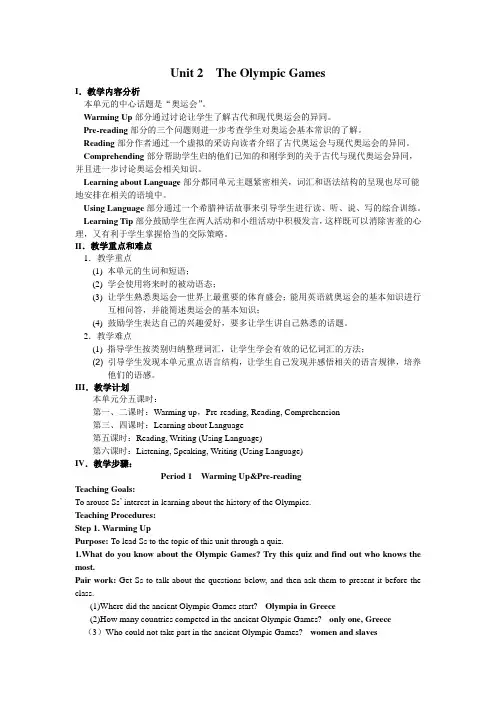
Unit 2 The Olympic GamesI.教学内容分析本单元的中心话题是“奥运会”。
Warming Up部分通过讨论让学生了解古代和现代奥运会的异同。
Pre-reading部分的三个问题则进一步考查学生对奥运会基本常识的了解。
Reading部分作者通过一个虚拟的采访向读者介绍了古代奥运会与现代奥运会的异同。
Comprehending部分帮助学生归纳他们已知的和刚学到的关于古代与现代奥运会异同,并且进一步讨论奥运会相关知识。
Learning about Language部分都同单元主题紧密相关,词汇和语法结构的呈现也尽可能地安排在相关的语境中。
Using Language部分通过一个希腊神话故事来引导学生进行读、听、说、写的综合训练。
Learning Tip部分鼓励学生在两人活动和小组活动中积极发言,这样既可以消除害羞的心理,又有利于学生掌握恰当的交际策略。
II.教学重点和难点1.教学重点(1) 本单元的生词和短语;(2)学会使用将来时的被动语态;(3)让学生熟悉奥运会—世界上最重要的体育盛会;能用英语就奥运会的基本知识进行互相问答,并能简述奥运会的基本知识;(4)鼓励学生表达自己的兴趣爱好,要多让学生讲自己熟悉的话题。
2.教学难点(1) 指导学生按类别归纳整理词汇,让学生学会有效的记忆词汇的方法;(2) 引导学生发现本单元重点语言结构,让学生自己发现并感悟相关的语言规律,培养他们的语感。
III.教学计划本单元分五课时:第一、二课时:Warming up,Pre-reading, Reading, Comprehension第三、四课时:Learning about Language第五课时:Reading, Writing (Using Language)第六课时:Listening, Speaking, Writing (Using Language)IV.教学步骤:Period 1 Warming Up&Pre-readingTeaching Goals:To arouse Ss’ interest in learning about the history of the Olympics.Teaching Procedures:Step 1. Warming UpPurpose: To lead Ss to the topic of this unit through a quiz.1.What do you know about the Olympic Games? Try this quiz and find out who knows the most.Pair work: Get Ss to talk about the questions below, and then ask them to present it before the class.(1)Where did the ancient Olympic Games start?Olympia in Greece(2)How many countries competed in the ancient Olympic Games?only one, Greece(3)Who could not take part in the ancient Olympic Games?women and slaves(4) When and where did the modern Olympic Games start?Athens in 1896(5 )Who was C hina’s first gold medal winner and for what event?Xu Haifeng for shooting(6) What are the three words that show the spirit of the Olympic Games?swifter higher stronger(7)What do the five rings on the Olympic flag stand for?the five continents(8)What are the official mascots for the Beijing Olympics?The five mascots are officially called the Five Friendlies.(9) How many gold medals did China win in the 29th Beijing Olympic Games? 51(10)What’s the motto of Beijing Olympic Games?One world, one dream2.Brainstorming:Name the events of the Olympic Games .Events of the Olympic GamesBoxing,Swimming,Cycling,Diving,Basketball,Badminton,Baseball,Archery,GymnasticsSailing, Horse riding, SoccerStep 2.Pre-readingPurpose: To have Ss learn about some more about Olympics and arouse their interest.Individual work: Get Ss to answer this question individually.1.Do you know any differences between the ancient and modern Olympic Games? List two of them.Ancient Olympic Games(1 )Only free citizens of one country take part(2 )Slaves and women could not take part(3) Always in the same place(4) Only once every four years(5 )Limited number of events which remained the sameModern Olympic Games(1) Competitors from many countries(2) All adults can take part if they reach the required standard for their event(3 )Hosted by different countries(4 )Summer and Winter Games; Special and Paralympics(5 )Many events which continue to increase2.When and where will the next Olympic Games be held?The next Olympic Games will be held in London in 2012.3.Show sth.about Beijing Olympic games.Homework:(1.)Write a passage about your idea about the Beijing 2008 Olympic Games in about 100 words.(2)Preview the reading: AN INTERVIEW课后记载:Period2 Reading1Teaching goals:1.train ss’ reading ability.2.let ss learn sth. about earthquake in tangshan.Teaching Procedures:Step1.Fast-ReadingListen to the tape and get the general ideas.This interview is mainly about ______.A. the story of a Greek writer Pausanias and a Chinese girl Li YanB. a magic journey by PausaniasC. the similarities and differences about the ancient and modern OlympicsD. the ancient Olympic Games in GreeceStep2.Careful-reading1. Where do all the competitors live?A. A hotel.B. A place hired by competitors.C. A restaurant.D. A special village.2. Which of the following is included in the Winter Olympic Games?A. Skiing and ice skating.B. Running and races.C. Horse riding.D. Swimming.3. Why do so many countries want to host the Olympic Games?A. To run faster, jump higher and throw further.B. To get a great honor.C. To make the country famous.D. To make money.4. Why does Pausanias think people may be competing for money in the modern Olympic Games?A. Because the winner can get medals.B. Because the winner can be awarded lots of money by their own countries.C. Because the olive wreaths have been replaced by medalsD. Because medals are made of gold.5. How does Pausanias feel when he hears the Olympic Games are also about being able to run faster, jump higher and throw further?A. Surprised.B. Happy.C. Sad.D. Astonished.Step3.Post-reading1.Scan the passage to find out the characteristics and similarities of the ancient and modern2.Read the passage carefully again and finish Ex2 (P11).(1).What amazes Pausanias about the Olympic Games?(2 )Why does he think Athens and Beijing should feel proud?(3) Why does he think people may be competing for money in the modern Olympic Games? Suggested Answers:(1) Pausanias is amazed that many countries take part in the Olympic Games and women too and there are two sets of Games-the Winter and the Summer Olympics.(2) Because Li Yan has explained that it is a great honour to host the Olympic Games..(3)He thinks that so many things have changed in the Olympic Games that he fears that the spirit of the Olympics may have changed too.3.Discussion:finish Ex3 (P11).Discuss this question in groups:Why do many countries want to host the Olympic Games while others do not? Use the mind map below to help you.(1)Reasons to host the Olympic Games?(2)Reasons not to host the Olympic Games?4.summary:Retell the text by filling the following blanks.The Olympic Games are the biggest sports meeting in the world, which include two kinds, the _________and the ________ Olympics. Both of them are ______ every ____ years. All countries can take part if their athletes reach the ________ to the games. Women are not only _______ to join in but playing a very __________ role.A special _______ is built for the competitors to live in, several ________ for competitions, a large swimming pool, a __________ as well as seats for those who watch the games. It’s a great _______ to host the Olympic Games. The olive wreath has been _________ by medals. But it’s still about being able to run ______, jump ______ and throw _______.Step4.Homework1.Read the text again and underline some important phrases and difficult sentences.2. Surf the Internet to find more stories about the ancient Greek and you are expected to share them with your peers in the next class.课后记载:Period 3 Language pointsTeaching goals:1. To enable Ss to master some new and useful words and expressions.2. To get Ss to have knowledge of language points.Teaching procedures:Step 1: Language pointsPurpose: To train Ss’ language capacity.1. Ss give the phrases and expressions according to the Chinese T gives2. Ss raise Qs on some difficult points they found while reading the textReading text:1.Take part in/join in 参加2.The spirit of ……精神、宗旨、灵魂ed to 过去常常4.Find out 查明,找出5.Every four years 每四年,每隔三年6.All over the world (遍及)全世界7. A set of 一套,一组pete with/against 和……竞争pete for…为……而竞争10.be admitted to 获准做某事11.be admitted as 作为…被接受12.reach the standard 达到……水平、标准13.play an important role/part in 在……方面扮演重要角色(起重要作用)14.as well as 和……一样15.think you for your time 感谢您(能抽空……)e from the same root 同根17.Have (no) chance of doing sth. 有(没)做……的机会18.Go with 伴随,与……搭配19.relate…to…把……与关联起来20.relate with 和……有关21.Run against…和……赛跑22.Hear of 听说23.Make sure 确定24.Take turns 轮流25.One after another 一个接一个1.go/start/ come/ be on a journey进行旅行eg.My father is away on a journey.find out about 弄清有关……的情况eg.The police are trying hard to find out about the accidenton a journey 在进行旅行on business 在出差2.interview sb. 采访/面试某人 a job interview 求职面试 a television interview 电视采访3.I lived in what you call “Ancient Greece”and I used to write about the Olympic Games more than 2,000 years ago. (P9)我生活在你们所说的“古希腊”,我曾经写过2000年前奥林匹克运动会的情况。
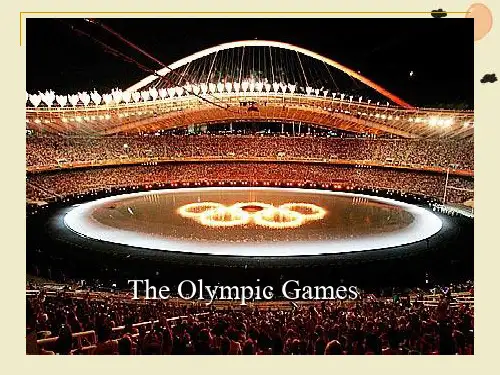
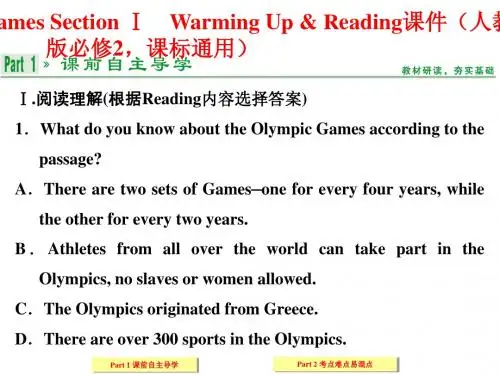
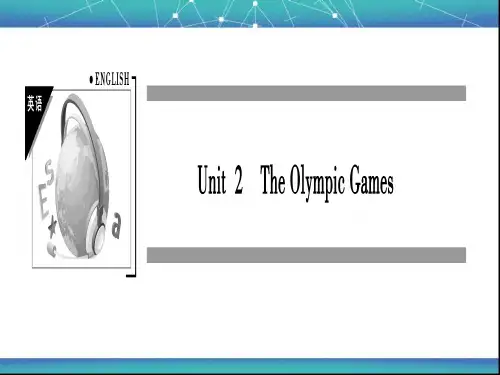
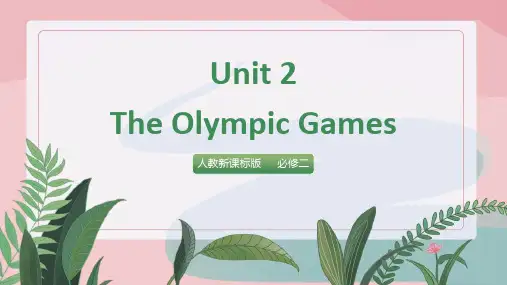
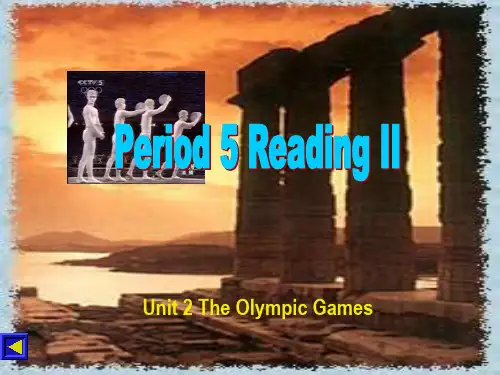
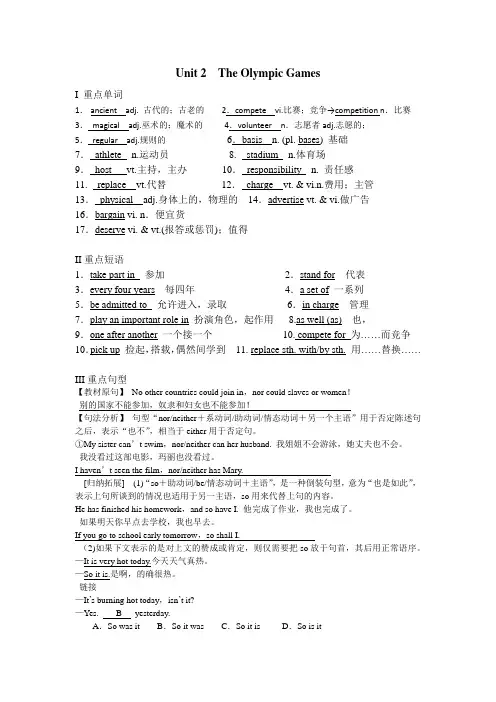
Unit 2The Olympic GamesI 重点单词1.ancientadj.古代的;古老的2.compete vi.比赛;竞争→competition n.比赛3.magicaladj.巫术的;魔术的4.volunteern.志愿者adj.志愿的;5.regularadj.规则的6.basisn. (pl. bases) 基础7.athlete n.运动员8. stadium n.体育场9.host vt.主持,主办10.responsibility n. 责任感11. replacevt.代替12.chargevt. & vi.n.费用;主管13.physical adj.身体上的,物理的14.advertise vt. & vi.做广告16.bargain vi. n.便宜货17.deserve vi. & vt.(报答或惩罚);值得II重点短语1.take part in 参加2.stand for代表3.everyfour years每四年4.a set of一系列5.be admitted to 允许进入,录取6.in charge管理7.play an important role in扮演角色,起作用8.as well (as)也,9.one after another 一个接一个pete for 为……而竞争10.pick up捡起,搭载,偶然间学到11. replace sth. with/by sth.用……替换……III重点句型【教材原句】No other countries could join in,nor could slaves or women!别的国家不能参加,奴隶和妇女也不能参加!【句法分析】句型“nor/neither+系动词/助动词/情态动词+另一个主语”用于否定陈述句之后,表示“也不”,相当于either用于否定句。
①My sister can’t swim,nor/neither can her husband. 我姐姐不会游泳,她丈夫也不会。
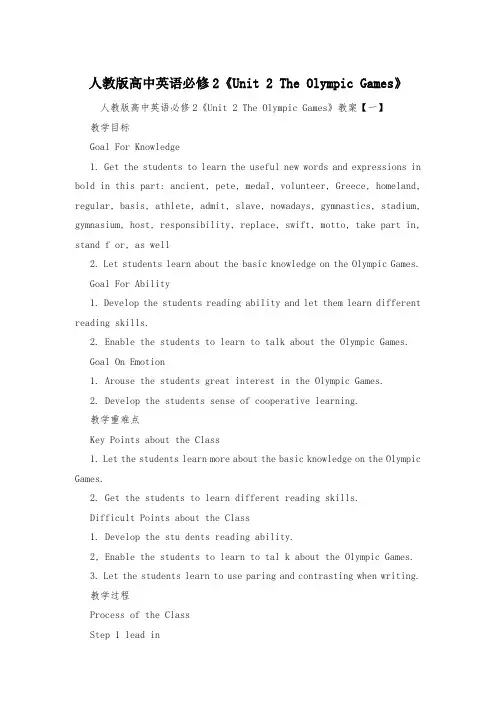
人教版高中英语必修2《Unit 2 The Olympic Games》人教版高中英语必修2《Unit 2 The Olympic Games》教案【一】教学目标Goal For Knowledge1. Get the students to learn the useful new words and expressions in bold in this part: ancient, pete, medal, volunteer, Greece, homeland, regular, basis, athlete, admit, slave, nowadays, gymnastics, stadium, gymnasium, host, responsibility, replace, swift, motto, take part in, stand f or, as well2. Let students learn about the basic knowledge on the Olympic Games. Goal For Ability1. Develop the students reading ability and let them learn different reading skills.2. Enable the students to learn to talk about the Olympic Games. Goal On Emotion1. Arouse the students great interest in the Olympic Games.2. Develop the students sense of cooperative learning.教学重难点Key Points about the Class1. Let the students learn more about the basic knowledge on the Olympic Games.2. Get the students to learn different reading skills.Difficult Points about the Class1. Develop the stu dents reading ability.2, Enable the students to learn to tal k about the Olympic Games.3. Let the students learn to use paring and contrasting when writing.教学过程Process of the ClassStep 1 lead in1. IntroductionAs we know, the ancient Olympic Games took place in Olympia in Greece every four years between 776BC and 339BC. Only men and boys could pete in the ancient Olympic Games. Married women were not even allowed to watch the Games; only young girls, boys and men could watch.However, in modern times, there are two main sets of Gamesthe Summer and Winter Olympics, and both are held every four years. Athletes from any country who have reached the agreed standard for their event will be admitted as petitors. Therefore, there are many significant differences between the modern and ancient Olympics, although certain similarities exist.In this text, Pausanias, an ancient Greek writer, has e on a magical journey to find out more about the ancient and modern Olympics. Has he got what he wants to know? I think you have got the answer. OK. First, lets do a survey about Olympics.Reflection:This part is to introduce the students to the text briefly to make the text easy for them to read.6. How many main kinds of the Olympic Games are there in the world?7. What is the motto of the Olympic Games?8. What is the host city of the first Olympics?9. What is the host city of the 202X Olympics?10. What is the host city of the 202X Olympics?Suggested keys:1-5 CBCDC6. Two. They are the Summer Olympic Games and the Winter Olympic Games.7. Higher, swifter and stronger.8. Athens, Greece.9. Athens, Greece.10. Beijing, China.Reflection:This part is to arouse the interests of the students on Olympic Games and get them into the reading slowly.Step 2 Pre-readingAsk the students to look at the title of the text and the pictures in it and talk about them.1) TitleAn InterviewAn interview is a meeting in which someone is asking another one some questions in order to find out about their actions or opinions.2) The first picture in the textThe first picture is the statue of a great Greek. His name is Pausanias. He was a famous traveler and writer in the second century AD.3) The second picture in the textThe second picture is a Chinese athlete named Yang Yang. She won a gold medal for China at the 202X Winter Olympic Games. She is a famous skating player.4) The third picture in the textThe third picture is the opening ceremony of the Olympic Games. Maybe this is the main stadium. Its large and can hold thousands of audience. See in the sky the five white rings? They are the Olympic Five Rings which stand for the five continentsAsia, Africa, the Americas, Europe and Oceania.Reflection:This step is to help the students make a further understanding of the text.Step 3 Readingprehending1 . Reading for the main ideaWhat does the passage mainly tell about?Suggested answer:This text mainly tells about the similarities and the differences between the ancient and modern Olympic Games.2. Reading for detailed informationAsk the students to read this text carefully to locate detailed information and then choose the best answer.1) Where do all the petitors live?A. A hotel.B. A special village.C. A restaurant.D. A place hired by petitors.2) Why do many countries want to host the Olympic Games?A. To run faster, jumper higher and throw further.B. To get a great honour.C. To make the country famous.D. To make money.3) Which of the following is included in the Winter Olympic Games?A. Skiing and ice skating.B. Running races.C. Horse riding.D. Swimming.4) The last Olympic Games were held in _________.A. BeijingB. AtlantaC. AthensD. Sydney5) Why does Pausanias think people may be peting for money in the modern Olympic Games?A. Because the winner can get medals.B. Because the winner can be awarded lots of money by their own countries.C. Because the olive wreaths have been replaced by medals.D. Because medals are made of gold.Suggested answers: 1)–5) BBACCReflection:This part is to check if the students have truly understood the text.3. Read the passage carefully and answer the following questions.1) What amazes Pausanias about the Olympic Games?2) Why does he think Athens and Beijing should feel proud?Keys:1) Pausanias is amazed that many countries take part in the Olympics and women too and there are two sets of Olympics.2) Its a great honour to host the Olympics.Reflection:This part is to enable the students to have a deep understanding of the text by answering some difficult questions.Keys:1. one2. women; slaves3. Greece4. two5. reached; agreed standard6. anywhere in the worldReflection:This part is to strengthen the key content in the text.5. Summary writing 归纳写作Answer these questions in not more than 100 words.回答下列问题,将答案组成一个段落,不要超过100个单词。
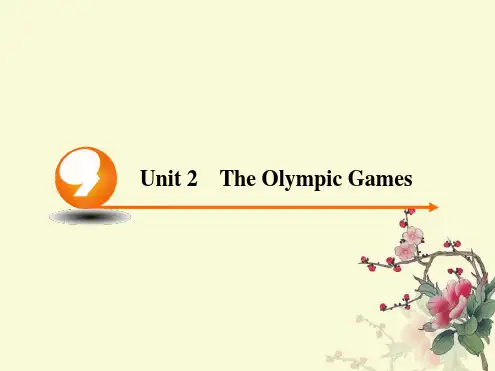
高一人教版必修2unit2theolympicgamesperiod2an采访教学背景:教学对象是高一新生,英语基础知识和听、说、读、写能力都处于英语中上等水平。
现在仍属于初、高中衔接时期,所以在阅读课型上仍不太适应对长篇文章的整体理解。
因此,通过让们积极参与实践、学习和使用英语,调动他们学习英语的兴趣,培养他们的阅读技能是本节课的目标。
教材分析:本单元的中心主题是“奥运会”——世界上最重要的体育赛事。
通过本单元的学习,学生可以了解奥运会的起源、目的和项目。
同时介绍了一些古希腊神话传说和一些著名人物。
本课是本单元教材重组后的第二节课。
阅读课通过虚拟采访向学生介绍古代奥运会和现代奥运会的异同,以及奥运会的一些基本信息。
教学目标:本课为阅读型课,主要是通过阅读材料让学生抓住要点获取(1)知识目标:熟悉并掌握一些新单词和短语的用法。
(2)能力目标:通过本节课的学习培养学生快速寻找文章细节、归纳和总结的阅读能力。
(3)情感目标:使学生熟悉奥运会相关知识,激发兴趣,培养民族自豪感和参赛意识,增强民族荣辱观,激发强烈的爱国主义精神。
(4)教学过程:step1review1) Gooversomeneword进入这里,回答问题。
(教师使用T-S风格用英语或汉语提问以下单词)mean/Green/Magic/interview/host/athlets/admissed/slave/Stadium/prize/gym/aswel l/replace 2)复习警告中的两个问题:q1:whowaschina′sfirstgoldwinnerandforwhatevent?(5)教学策略:多媒体课件(xuhaifeng,shooting)问题2:哪三个词体现了奥运会的精神?(更快、更高、更强)【设计意图】由于对教材进行了重组,在进行第一课时时,我已经有意让学生了解了与本节课有关的生词和内容,为学生对reading的理解做了铺垫。
高一英语同步练习必修2 Unit 2 The Olympic Games第2课时 Reading基础练习阅读理解Baron Pierre de Coubertin was a Frenchman. At his time sports were not taught in French schools. De Coubertin believed that sports should go hand in hand with studies. He had an idea. His idea was to begin the Olympics all over again.Sports teachers of other countries liked de Coubertin’s ideas. So in 1896, the modern Olympic Games were held in Athens, Greece. Since then the Olympics have been held once every four years, except three times, when there were wars.Before the start of the Olympic Games, runners carry lighted torch through many nations towards the stadium where the games will be held. These sportsmen are from different countries. Yet they work together to carry the Olympic torch. It is passed from runner to runner. When the last runner enters the stadium, he or she places the torch in a special basin filled with oil. It catches fire. It is then, only then, that the Olympic Games can begin.The Olympic flame(火焰)burns throughout the games. It is the flame of peace.1.Before 1896 French schools didn’t teach .A. mathsB. historyC. sportsD. chemistry2. De Coubertin .A. was the first man to start the Olympic GamesB. helped start the modern Olympic GamesC. believed that sports were less important than studiesD. failed to begin the modern Olympic Games3. According to this passage, the third modern OlympicGames should have been held in .A. 1915B. 1924C. 1896D. 19044. Which of the following is NOT true?A. The Olympic Games don’t begin until the basin of oilcatches fire.B. The torch is carried from runner to runner throughmany countries.C. Runners who carry the torch can be men or women.D. After the start of the Olympics, the Olympic flame isput out.实战演练一. 根据课文内容填空The ancient Olympic Games began around the year 776 BC in ______. At that time the young men ________ in running, jumping and wrestling. But women were not allowed to ____ ____ ___ the games in the past. The old Olympic Games _______ about the year 393 AD.However, the first Olympic Games in ______ times happened in the year 1896. But there were only 311_________ from 13 countries. The Olympic ______ is “_______, Higher, and Stronger”. It means that every_______ should try to ____faster, ______ higher, and _____ further.二. 单句改错1.The ancient Greek Olympic Games was held every fouryears.______________________________________2.Slaves and women were prevented competing.______________________________________3. I like the performance, because many actors took partin.______________________________________4. It was foolish for him to cheat in the exam.______________________________________5. I used to the weather in Beijing now.______________________________________三. 汉译英1. 奥林匹克运动会每四年进行一次。
The lecture of teaching plan for Unit 2 Book 2Good morning, ladies. I am appling for the Qualification Certificate for Senior English Teaching。
Teaching Material(Book 2,unit 2)1、This lesson is about the well-known event —— the Olympic Games. The article concentrates on the history of the Olympic Games:the beginning of the Olympics, the development of the Olympics, the modern Olympic Games and the spirits of the Olympics.2、Th e content of this unit is connected to students’ real life and learning demands. Because the 2016 Summer Olympics in Brazi just ended。
The analysis of students(Senior 1)1、Being equipped with basic English knowledge,like letters,phonetics,pronunciation, words,sentences and grammar,but still need more practice。
2、The senior 1 students have great passion for English and ability of using Englishin class.Teaching aims and demandsⅠ。
人教版高一英语必修二Unit 2课文翻译Unit 2 The Olympic GamesReadingAN INTERVIEW采访Pausanias, who was a Greek writer about 2,000 years ago, has come on amagical journey on March 18th 2007 to find out about the present-dayOlympic Games. 帕萨尼亚斯是大约2000年前的一位希腊作家,他于2007年3月18日作了一次魔幻旅行,来打听当代奥林匹克运动会的情况。
He is now interviewing Li Yan, a volunteer for the 2008 OlympicGames. 现在他正在采访一位2008年奥林匹克运动会的志愿者李燕。
P: My name is Pausanias. I lived in what you call “Ancient Greece” and I used to write about the Olympic Games a long time ago. I’ve cometo your time to find out about the present-day Olympic Games because Iknow that in 2004 they were held in my homeland. May I ask you somequestions about the modern Olympics?帕:我叫帕萨尼亚斯。
我生活在你们所说的“古希腊”。
我曾经写过很久以前奥林匹克运动会的情况。
现在我来到你们这个时代,想了解有关当代奥运会的情况,因为我知道2004年奥运会是在我的祖国举行的。
我可以问你几个有关现代奥林匹克运动会的问题吗?微信公众号:简单高中生(ID:jiandan100cn)L: Good heavens! Have you really come from so long ago? But ofcourse you can ask any questions you like. What would you like to know?李:天哪!你真的来自那么久远的年代?当然你可以问你想问的问题。